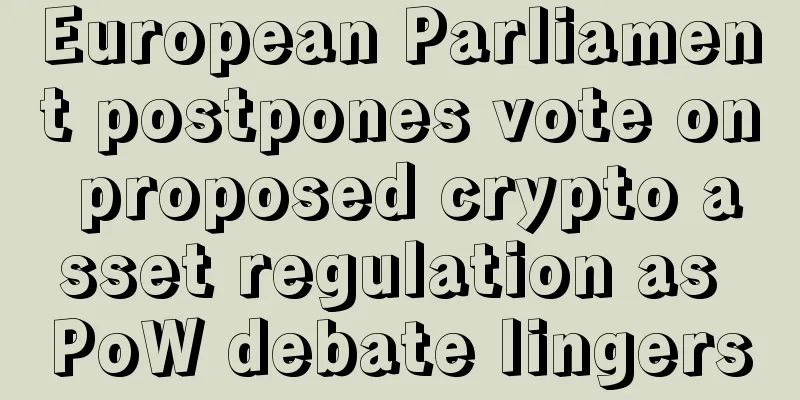European Parliament postpones vote on proposed crypto asset regulation as PoW debate lingers

summary:
The European Union Parliament has postponed a key vote on its long-awaited regulation of cryptocurrency markets in response to discontent from the crypto world. According to CoinDesk yesterday, EU lawmakers are preparing for an inter-institutional discussion on proposed regulations for managing crypto assets and may ban energy-intensive cryptocurrencies such as Bitcoin. A draft shows that the MiCA regulatory plan to be discussed includes a clause that may restrict the use of the PoW consensus mechanism in the 27 EU member states. It is reported that the clause seeks to ban crypto services that rely on consensus mechanisms that are not conducive to the environment from January 2025, and specifically mentions PoW. EU lawmaker Stefan Berger, who is the lawmaker responsible for handling the process and content of the MiCA legislative package, said the debate on energy issues has escalated. Berger said he does not think MiCA is the place to address technology or energy-related rules because the package seeks to regulate cryptocurrencies as assets. Under the rule, these cryptocurrencies could potentially qualify as exceptions if they operate on a small scale in a way that does not undermine the EU’s ability to meet its renewable energy targets. It is unclear how lawmakers intend to distinguish between small and large operations. Another provision supported by Berger would require white papers for PoW crypto assets to include an independent assessment of the network’s potential energy use. Berger also said that the European Commission, the Council and the Parliament will begin trilateral discussions on finalizing MiCA at the end of February. He added: "I still hope and expect that this amendment will be removed or significantly weakened in the upcoming trilateral negotiations." Berger pointed out that banning Bitcoin goes against MiCA's goals of promoting technology and protecting consumers. Dubbed “MiCA,” the Markets in Crypto-Assets Directive was originally put on the ballot for Feb. 28 and will be referred by the European Parliament to negotiations between the body and the EU Council and the European Commission — raising questions about future changes. However, the office of Stefan Berger, president of the European Economic Commission and rapporteur responsible for the vote, told The Block today that the vote has been postponed. A source close to the negotiations on the directive told The Block that the main focus of the debate was the late-stage changes, which some interpreted as a ban on PoW networks, mainly due to concerns about their energy use. After the relevant news leaked, triggering a series of negative reports and an overwhelming amount of unhappy responses on Twitter, right-wing and center-right members withdrew their support for the latest amendments. “As rapporteur, it is crucial for me that the MiCA directive is not misinterpreted as a de facto Bitcoin ban,” Berger explained on Twitter. It is reported that the directive has been in progress since 2019. The European Parliament has not yet officially announced the latest amendments. A draft on February 21 reads:
The delay in the vote was welcomed by many in the crypto industry. “Postponing the vote was the right decision as several crucial issues in the bill remain unresolved,” said Seth Hertlein, global policy director at Paris-based wallet maker Ledger. “Europe’s future financial competitiveness depends on getting MiCA right.” But as Patrick Hansen, head of strategy and growth at Berlin-based Unstopped Finance, points out, it remains to be seen how long that process will take. |
<<: Is cryptocurrency Russia's secret weapon against international sanctions?
>>: US media: Cryptocurrency makes it easier for Russia to circumvent sanctions
Recommend
Is it good to have a mole on the chin? What does a mole on the chin mean?
Generally speaking, if there is a mole on the fac...
A mole on the lower left side of the back indicates a promising future
Having moles is a very normal phenomenon, and mos...
What does a mole on the right shoulder mean? Is it good for a man to have a mole on his right shoulder?
Everyone has more or less traces of moles on thei...
How to tell the fortune from the mole on the shoulder
If you have a mole on your shoulder, it means you...
What is the fate of a woman with a mole on the right clavicle?
Moles have different meanings in different locati...
The karma of good and evil in face reading
The karma of good and evil in face reading Good d...
Bitpoint to Partner with Evolable Asia to Provide Bitcoin Payments to 1,400 Hotels and Inns in Japan
Golden Finance News - Bitcoin exchange Bitpoint w...
Detailed Explanation of the Sixty-Four Hexagrams_Hexagram 39: Water Mountain Jian
In ancient times, Zhouyi was the academic discipl...
NFT searches on Google hit an all-time high
According to data collected by The Block Research...
What kind of facial features on a woman indicate that she will have many romantic opportunities? What is peach blossom luck?
Some women have very good luck in love, while some...
What kind of man is the most romantic?
Want to know what kind of man is the most romanti...
What does horizontal lines on the bridge of the nose mean?
What causes horizontal lines on the bridge of the...
ConsenSys acquires space resource mining company
According to geekwire, ConsenSys has acquired the...
The dragon in the philtrum: a full nose bridge
People who are considered the best among men are ...
Where are the moles on your body that indicate noble people?
From the perspective of mole physiognomy, moles wi...









